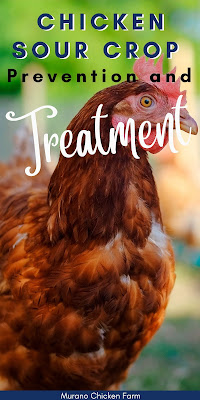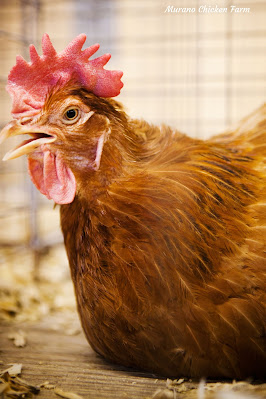Last week a friend asked me to stop over and take a look at one of her hens. The poor thing had a full crop and it didn't seem to be going down overnight. Also, my friend told me the chicken had bad breath! Chickens don't really get bad breath so I knew there had to be something wrong with her crop and went over to take a look. Turns out her hen had sour crop.
Today we're going to discuss what sour crop is in chickens? Is it common and how can I diagnose and treat it?
Chickens are likely to eat just about anything, so it's not unusual for them to have crop problems. When chickens feed, the crop will fill up during the day and empty overnight. If the crop has not emptied, there is something wrong with digestion or a problem with what they're eating!
Sour crop often starts by a blockage or slow emptying of the crop. Unfortunately, it often goes along with impacted crop and can cause pendulous crop!
How does the crop work?
A chicken's crop is just below its neck and at the center of its chest. When the chicken eats, the food goes down the esophagus and into the crop and stays there till it moves through the rest of the digestive tract. Call it food storage if you will. This is where the first stage of digestion takes place.
The crop slowly empties as the food moves through it. Most chickens eat all day long so by nighttime the crop looks pretty full. Since they don't eat overnight, by morning the crop should be empty. If the crop does not empty, the food inside it can go bad and the chicken develops a sour crop.
Also. if a chicken eats long grasses, hay, straw or other difficult to digest foods they can sort of ball up and get stuck in the crop. If this is not causing a complete blockage the chicken will continue to eat each day. Fresh food on top of old food starts to rot and then the yeast overgrows and we have sour crop.
Sour crop is a overgrowth of yeast in the chickens crop.
Sour crop detection and symptoms
The first indication of sour crop in chickens is a crop that does not empty overnight. When you open the beak or get really close to the chickens face, there is often a sour, foul smell. That bad breath my friend was talking about. When you touch the chickens crop and there is a puffy squishy feeling, sour crop is setting in if it is not yet impacted. Sort of like a soft stress ball or full water balloon.
You would think this uncomfortably full feeling would keep a chicken from trying to eat more but no, they will still try to eat more! This of course would make them more uncomfortable, so you need to address this as soon as you notice it!
Sour crop treatment
Withhold food for 24 hours to allow the crop to empty. Now smell her breath and if it smells yeasty or like spoiled milk you'll need to start treatment.
Sour crop is caused by the yeast Candida albacans. Since it is pretty much a yeast infection and there are no commercial poultry medications available for it, you're going to have to use a yeast infection product made for humans. You'll need to get Monistat 7 cream and feed her 0.50 cc for 7 days.
I do it once a day but if symptoms aren't getting better in 4-5 days then start giving it twice a day.
Yes, I know how weird it is, but unless you want to contact a doctor for the stuff they use on babies when they get thrush in their mouths...this is all we got!
To make sure the medication has the 'space' to work: withhold food and water for 1/2 hour before treatment and a full hour after. Probably best to just remove food and water at bedtime and give the medication first thing in the morning.
Give her yogurt with live and active cultures and scrambled eggs for her meals while undergoing treatment. You can give a small amount of cooked veggies but don't let her over eat as the crop needs to rest and heal.
I have seen online that some people treat sour crop with ACV and oregano. All I can say is if I had an internal yeast infection I would use real medicine first! Preventatives are great in the weeks after treatment, but I fully believe in medication to treat illnesses!
This is coming from a person who also writes about herbal and traditional medicine in humans! I fully believe in natural treatments but they often take longer to work and I like to get my chickens feeling better ASAP.
Monistat doesn't have any bad side effects so there's no harm in going straight for the medication on this one!
WHAT NOT TO DO:
Whatever you do don't turn the chicken upside down to 'make it vomit' and remove the food in it's crop! There's more of a chance of it aspirating some of the liquid than safely evacuating it. Chickens don't vomit!
Prevention of Sour Crop
To prevent sour crop, check the chickens every morning before they feed. Just take a look at them and make sure the crop area is flat. It should empty every night and go from that bedtime bulge to not even noticeable.
If the crop does not go down overnight, put the affected chicken in a hospital cage and withhold food that day. Provide water. You can lightly massage the crop from top to bottom to help break it up or give a tiny bit of olive or coconut oil orally. If this doesn't help after 24 hours you'll need to move on to treatment for impacted or sour crop.
If you have hay or straw in their coop make sure they are not eating it. Long tough grasses can ball up in the crop and cause an impaction so you'll want to keep the greenery around their coop trimmed down to a reasonable level. Small pieces of grasses go down just fine!
Sour crop is just one of the problems chickens can have in their crops and most of them are caused by crop impactions. If the crop will not empty and remains full and stretched for too long it can cause pendulous crop. If your chickens crop has not gone down for several days you'll need to take care of that. Check out Treating Pendulous Crop In Chickens.
~L
Want information on raising chickens sent right to your email weekly? Click right here to join my list and get new posts sent directly to you the day they're published ... plus, you'll also get the free download '25 Ways to save money raising chickens'




Thank you! Your suggestions and recommendations helped so much. It took almost four weeks of ongoing treatment. Once we knew that she could digest some of her food (based on some green elimination on the third day), and that her system was not 100% blocked, that was a huge relief. We were able to fully clear the impact after about 10 days. Took another week to clear the sour crop that relapsed. She didn't care for the scrambled eggs after a few day so we started an assembly line of fermentation. For three weeks, she ate small amounts of fermented chick starter with olive oil poured over it. She would literally lick the plate to finish the olive oil. The fourth week, it was just fermented chick starter without the oil, but mixed with probiotics while gradually phasing her back onto her normal rations. She's back with the flock finally, and we are keeping a close eye on her. Your guidance is very much appreciated! Thank you for sharing your wisdom.
ReplyDeleteAwwww yeay! I'm so glad that she's feeling better! Thanks for sharing your success story!
DeleteLisa